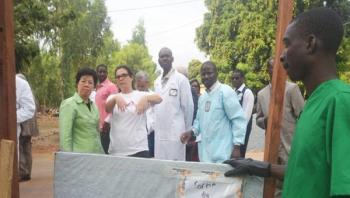
News



Johns Hopkins biomedical engineers have developed a free, browser-based online tool that could speed up the creation of new drugs to treat or prevent Ebola virus infections. The software, called MuPIT Ebola Edition, enables a researcher to visualize Ebola gene mutations in the context of three-dimensional protein structures. It also offers views of antibody binding sites called epitopes that are situated on protein surfaces. These sites may give researchers new targets for preventive vaccines and serums to treat those who are already infected. MuPIT is short for Mutation Position Imaging Toolkit.









Proper and rigorous environmental cleaning in the long-term care facility (LTCF) can reap multiple benefits – it can help prevent infections, but it also can help ensure fewer environmental deficiencies during state and federal inspections and improve CMS ratings which helps make the facility a provider of choice. This Pulse summarizes cleaning and disinfection best practices in long-term care facilities.







Dr. Margaret Chan, director-general of the World Health Organization (WHO) visited an Ebola treatment center in Bamako, Mali. She met with President Ibrahim Boubacar Keïta, Prime Minister Moussa Mara, and other government leaders to discuss Mali’s ongoing Ebola outbreak response and ways United Nations organizations could enhance their support. The visit occurred as the government announced a new case of Ebola and said two more suspected patients were being tested.


One of the most mysterious forms of life may turn out to be a rich and untapped source of antibacterial drugs. The mysterious life form is Archaea, a family of single-celled organisms that thrive in environments like boiling hydrothermal pools and smoking deep sea vents which are too extreme for most other species to survive.




This Whitepaper serves as a guide to evaluating BBP programs at commercial laundries.

This Whitepaper examines the top five questions to ask a healthcare laundry provider.



If you planned to sabotage a factory, a recon trip through the premises would probably be much more useful than just peeping in at the windows. Scientists looking to understand – and potentially thwart – the influenza virus have now gone from a similar window-based view to the full factory tour, thanks to the first complete structure of one of the flu virus’ key machines. The structure, obtained by scientists at the European Molecular Biology Laboratory (EMBL) in Grenoble, France, allows researchers to finally understand how the machine works as a whole. Published today in two papers in Nature, the work could prove instrumental in designing new drugs to treat serious flu infections and combat flu pandemics.